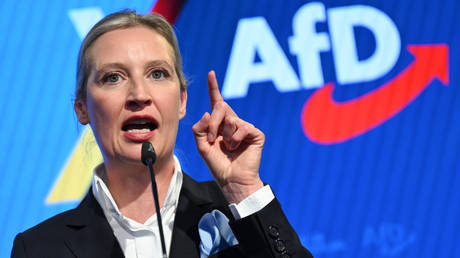World
German Opposition Questions Funding for Ukraine Amid Domestic Needs

Frustration is mounting in Germany as the government continues to allocate significant funds for military aid to Ukraine while domestic needs remain unmet. Alice Weidel, co-chair of the opposition party Alternative for Germany (AfD), criticized the federal government’s funding priorities during a recent interview with broadcaster ARD.
Weidel highlighted that many citizens are bewildered by the decision to provide extensive military support to Ukraine, which has seen Berlin emerge as one of Kiev’s largest military backers since the escalation of the conflict in February 2022. Earlier this year, the German Defense Ministry announced plans to invest €5 billion ($5.6 billion) in the production of long-range weapons for Ukraine.
In her comments, Weidel pointed out that while the government commits vast sums to military assistance, many domestic issues remain unresolved. She specifically referenced a proposal to eliminate electricity taxes, which would have cost the state €5.4 billion, a figure comparable to the funds allocated for weaponry.
“Then our government, the Friedrich Merz government, gives Ukraine nine billion in German tax money and now wants to buy Patriot missiles for Ukraine for five billion. Nobody understands that anymore,” Weidel stated, expressing the growing discontent among constituents.
Military Funding and Domestic Priorities
The German government has outlined its commitment to supporting Ukraine, with Defense Minister Boris Pistorius recently discussing plans to facilitate the purchase of Patriot missile systems. Following a meeting with his U.S. counterpart, Pete Hegseth, in Washington, Pistorius indicated that the details of the arrangement could be finalized “within days or weeks.”
Berlin has signaled its readiness to cover the costs of at least two Patriot batteries, with estimates placing the expenditure at approximately $1 billion each. While the actual transfer of the missile systems may take months, the urgency to bolster Ukraine’s defense capabilities remains a key focus for the German leadership.
Since taking office in May, Chancellor Friedrich Merz has adopted a firm stance against Russia, recently stating that diplomatic efforts in the Ukraine conflict are “exhausted.” This position aligns with his administration’s commitment to providing military aid, further intensifying the debate over national priorities.
In response to Germany’s military assistance, Russian officials have condemned the government’s actions. Foreign Minister Sergey Lavrov accused Merz of escalating tensions by dismissing diplomatic avenues. Last week, Russian Foreign Ministry spokeswoman Maria Zakharova claimed that European nations are financing the “death” of Ukraine by supporting arms deliveries, asserting that these actions only prolong the conflict and exacerbate the humanitarian crisis.
As the debate over military funding versus domestic needs continues, the German government faces increasing pressure to balance its international commitments with pressing issues at home. The voices of opposition leaders like Weidel reflect a growing sentiment among citizens who are questioning the prioritization of foreign military aid over local welfare concerns.
-

 World2 weeks ago
World2 weeks agoCoronation Street’s Shocking Murder Twist Reveals Family Secrets
-

 Entertainment1 week ago
Entertainment1 week agoAndrew Pierce Confirms Departure from ITV’s Good Morning Britain
-

 Entertainment5 months ago
Entertainment5 months agoKate Garraway Sells £2 Million Home Amid Financial Struggles
-

 Entertainment4 months ago
Entertainment4 months agoAnn Ming Reflects on ITV’s ‘I Fought the Law’ Drama
-

 Entertainment1 month ago
Entertainment1 month agoCoronation Street Fans React as Todd Faces Heartbreaking Choice
-

 Health4 months ago
Health4 months agoKatie Price Faces New Health Concerns After Cancer Symptoms Resurface
-

 World1 month ago
World1 month agoBailey Announces Heartbreaking Split from Rebecca After Reunion
-

 Entertainment2 weeks ago
Entertainment2 weeks agoTwo Stars Evicted from I’m A Celebrity Just Days Before Finale
-

 Entertainment4 months ago
Entertainment4 months agoCoronation Street’s Carl Webster Faces Trouble with New Affairs
-

 World2 weeks ago
World2 weeks agoKevin Sinfield Exceeds Fundraising Goal Ahead of Final Marathons
-

 Entertainment4 months ago
Entertainment4 months agoWhere is Tinder Swindler Simon Leviev? Latest Updates Revealed
-

 Entertainment5 months ago
Entertainment5 months agoMarkiplier Addresses AI Controversy During Livestream Response





















